As Sport Searches For Captivating Rivalry, An Appreciation Of the Michael Phelps-Ryan Lochte Duels
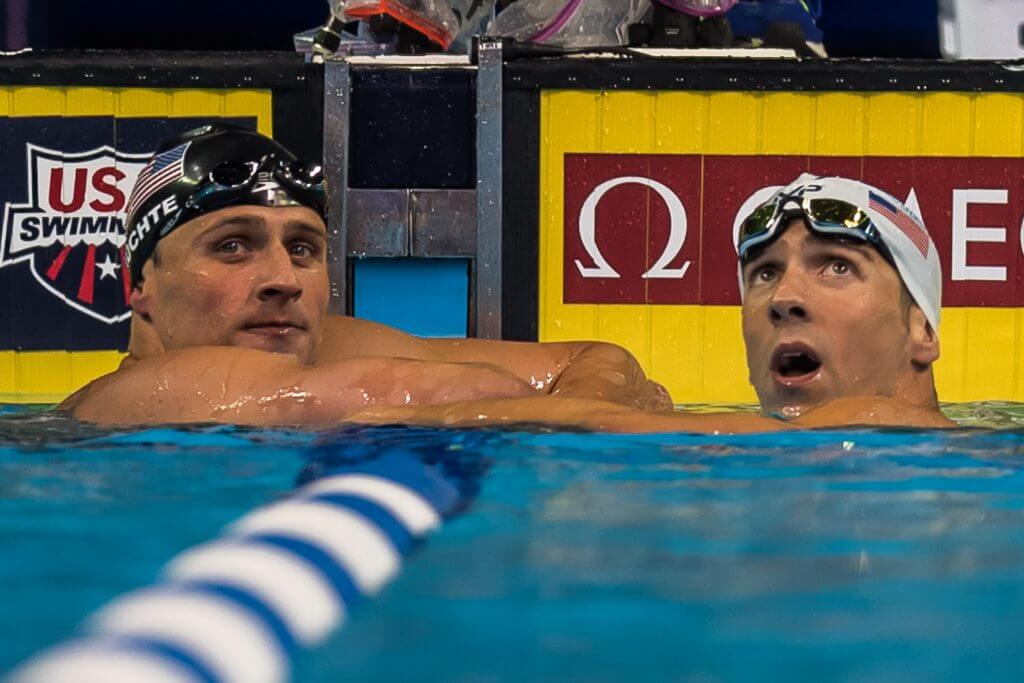
As Sport Searches For Captivating Rivalry, An Appreciation Of the Michael Phelps-Ryan Lochte Duels
This summer, the World Championships will return after a three-year hiatus, held at the Duna Arena in Budapest. But with priorities differing for various athletes, some desired matchups will not materialize. No Caeleb Dressel vs. Kyle Chalmers. No Katie Ledecky vs. Ariarne Titmus. No Lilly King vs. Tatjana Schoenmaker.
Of course, there will be several superb clashes, such as Dressel meeting Kristof Milak in the 100 butterfly and Kaylee McKeown battling Regan Smith and Kyle Masse in the 100 backstroke. Still, without a full-field version of the World Championships, some rivalries will be put on hold – and that’s disappointing.
The absence of a truly captivating rivalry in the sport only highlights how fortunate we were to have witnessed the years-long duel between Michael Phelps and Ryan Lochte. So, we revisit what those American superstars provided the sport during what can only be described as a special time.
******************************
All sports, especially those of an individual nature, have defining rivalries that attract fans’ attention. Boxing had Ali-Frazier. Tennis had Borg-McEnroe and Navratilova-Evert, and the recent triangular rivalry of Federer-Nadal-Djokovic. Look to golf for Palmer-Nicklaus and Woods-Mickelson.
The beauty of a rivalry is how it can take a variety of forms. A battle of conflicting styles. A clash of personalities. A fight for supremacy. A duel between the aging veteran and the talented upstart. All these versions are intriguing, and sometimes they will overlap with one another to make for an even tastier tale.
Such was the construction of the rivalry between Michael Phelps and Ryan Lochte.
When Phelps broke onto the international scene as a 15-year-old finishing fifth in the 200-meter butterfly at the 2000 Olympic Games in Sydney, it was a matter of time before his talent projected to additional events. And, indeed, by the 2003 World Championships, there was Phelps, capturing three gold medals and a silver medal in solo events to etch himself as his sport’s undisputed king.
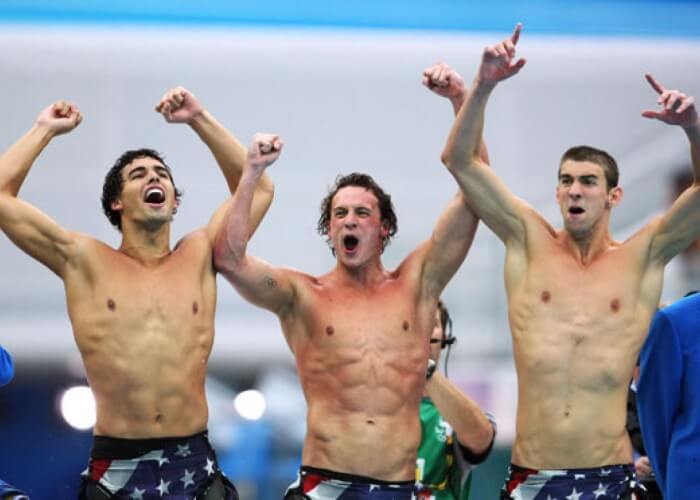
Photo Courtesy: NY Daily News
By all methods, Phelps was the measuring stick in the sport, this still-developing force who could do a little bit of everything – and at a peak level. At the 2004 Olympics in Athens, his six golds and two bronze medals made him the first athlete to win eight medals in an Olympiad, his multi-discipline pursuits generating nonstop comparisons to the legendary Mark Spitz.
In Athens, a much quieter ascension was also unfolding. As Phelps won gold in the 200 individual medley, the silver medalist was Lochte, nearly two seconds back. More, Lochte handled the second leg on the United States’ gold-medal winning 800 freestyle relay that put an end to Australia’s six-year international reign on the event. The week was Lochte’s assurance that he belonged at the elite level.
“I just came here to have fun and right now I’m having a blast,” Lochte said of his Olympic debut. “It’s amazing to swim for the USA at the Olympics.”
Over the next four years, through the 2008 Olympics in Beijing, the Phelps-Lochte rivalry echoed what was witnessed in Athens: Phelps was Batman, and Lochte was Robin. To think the rivalry was anything but superhero and sidekick would have been foolish, as evidenced by Phelps’ overwhelming dominance. In races with Lochte in major competition, defined as the Olympics, World Championships, Pan Pacific Championships and Olympic Trials, Phelps owned a 12-0 advantage over Lochte.
At that time, the truth is that Phelps had a more-balanced rivalry with Ian Crocker. The two had battled in the 100 butterfly since 2003, with Crocker holding the world record and winning world titles in 2003 and 2005. Phelps, meanwhile, won Olympic crowns in 2004 and 2008 and captured the world title in 2007. But the combination of Crocker retiring and Phelps facing Lochte in multiple events made the rivalry with Lochte more visible.
Although Lochte had been unable to beat Phelps through Beijing, it would be unfair to state Lochte was not making progress. His times in the medley events continued to drop and he was a regular presence on international podiums. Meanwhile, at the 2007 World Championships in Melbourne, Lochte snapped Aaron Peirsol’s six-year unbeaten streak in the 200 backstroke by setting a world record. At the Olympics in Beijing, he again defeated Peirsol and further lowered his global standard. Although he wasn’t beating Phelps, Lochte proved himself capable of taking down a giant in the sport, and the success provided confidence that Phelps, too, could be toppled.
“I believe in myself,” Lochte said. “A lot of people look at Michael and think he can’t be beaten. That’s not me. I know I can beat him. That’s that competitive edge that I have. I never feel like I’m going to lose, not matter who I’m racing. I always feel like I can win.”
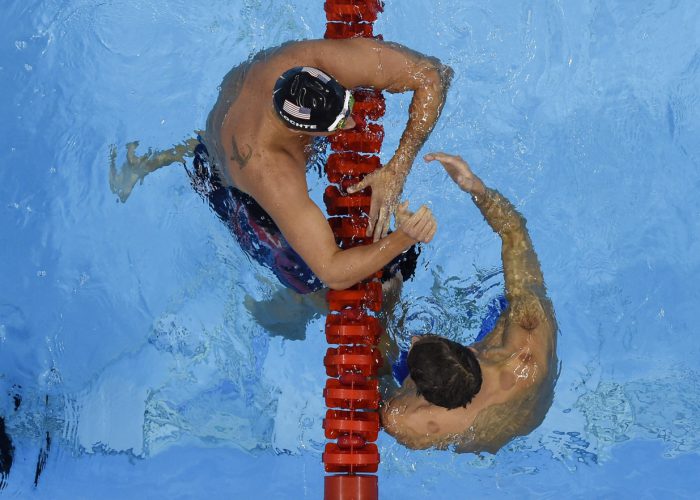
Photo Courtesy: USA TODAY Sports-USA TODAY Sports
With Beijing in the past, Lochte used the summer of 2009 to ascend to the top of the world in the medley events – albeit with Phelps absent and focusing on other events. At the World Championships, Lochte doubled in the 200 I.M. and 400 I.M., but it was what he managed the next summer that truly changed the dynamic of the rivalry. Competing at the 2010 United States National Championships, Lochte finally got the best of Phelps in a high-profile race, winning the 200 individual medley by more than a second.
The momentum generated by Lochte carried into the 2011 World Championships, where Lochte won four individual gold medals and beat Phelps in the 200 freestyle and 200 individual medley. While Phelps was skipping practices and not as dedicated as he was earlier in his career, Lochte changed his diet and elevated himself to World Swimmer of the Year.
The losses to Lochte certainly didn’t sit well with Phelps, who was unaccustomed to being upstaged. And even though he knew he hadn’t adhered to his typical training program, that knowledge did little to alleviate his frustration.
“(Lochte) is super focused right now, and I think you can see that,” Phelps said. “He keeps putting the races together that are helping him win. To be honest, he’s just more prepared. That’s really what it comes down to. Races are always won by people who are most prepared. Give Ryan credit. We’ve been racing for years and he did the work to improve and put himself in the best position possible. I’m kind of playing catchup now. I think it’s more motivating. I remember back in 2000 and 2001 when I was trying to climb and climb and, finally, I got there. Being back in this position, I think, will be kind of fun.”
The 2012 Olympic campaign brought a split decision to the rivalry. While Lochte beat Phelps at the Olympic Trials in the 400 individual medley, the outcome at the Olympic Games was surprising. It wasn’t stunning that Lochte won gold in the event, but that Phelps finished fourth and off the podium. It was the first time since his Olympic debut in Sydney in which Phelps contested an event at the Olympics and walked away without a medal.
Phelps rebounded when the men clashed in the 200 individual medley. Defeating Lochte by .63, Phelps earned his third straight Olympic crown in the shorter medley. It was then off to retirement for Phelps. In his foe’s absence, Lochte continued to add to his world-title count and, with Phelps making a comeback, they engaged in a final showdown at the 2016 Olympics in Rio de Janeiro.
After prevailing at the Olympic Trials, Phelps punctuated the rivalry with his fourth straight Olympic gold in the 200 medley. While Phelps won by almost two seconds over Japan’s Kosuke Hagino, Lochte finished out of the medals in fifth. As far as the rivalry was concerned, it had come full circle, with the original king on his throne.
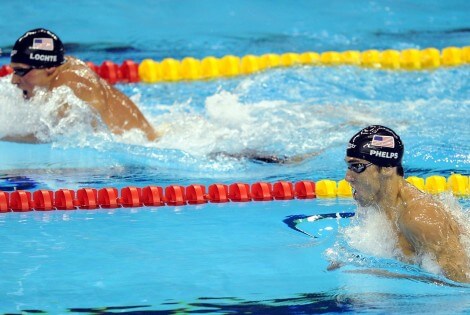
Photo Courtesy: O Sports via USA Today Sports
“The competitive environment between those two guys has always been good,” said Gregg Troy, Lochte’s longtime coach. “Even at their own testament, they both say they bring out the best in each other. And I think there’s a mutual respect, but also they’re very competitive and neither one has wanted to give in or go home.”
In the water, Phelps and Lochte might have shared the unique ability to shine over all strokes. Out of the pool, though, they were very much different.
“Ryan is the personality,” Austrian Olympic medalist Markus Rogan once said. “Michael is the machine. It’s such a dramatic difference. Ryan is more like a Dennis Rodman. Michael is more like a Tim Duncan.”
Phelps’ demeanor never changed from competition to competition, or event to event. When it was time to race, Phelps viewed the pool as his office or boardroom. Business was at hand, and moments for joking and smiling would wait. Via headphones or earbuds, the music pumping into Phelps’ ears was the only external noise he heard. Otherwise, he stared straight ahead, laser-focused on the task that awaited.
Lochte was the antithesis of Phelps. It’s not to say that he wasn’t dedicated to his craft and rising to the top of his events. One doesn’t attain the level of success Lochte realized without genuine focus. He just handled his business in a more lighthearted manner, bringing a surfer-guy and goofy persona to the deck. On various podiums throughout his career, including at the 2012 Olympic Games, Lochte wore decorative dental grills on his teeth. He was also known for his footwear style, as he always donned multi-colored sneakers for his walks to the starting block.
“My shoes with the teddy bears. My grill. That stuff was meant to lighten the mood,” Lochte said. “I mean, this world is so negative. If I can put a little bit of fun in people’s lives, then I’m cool with that.”
The problem for Lochte was that his frat-boy identity – at times – overshadowed the talent he possessed. If some fans of the sport were enamored by his silliness, others viewed Lochte as a jokester, and his decisions didn’t help assuage those notions. In 2013, he appeared on the E! Network’s “What Would Ryan Lochte Do?” It was an eight-episode reality show that chronicled Lochte’s life, and frequently focused on his drunken escapades with friends.
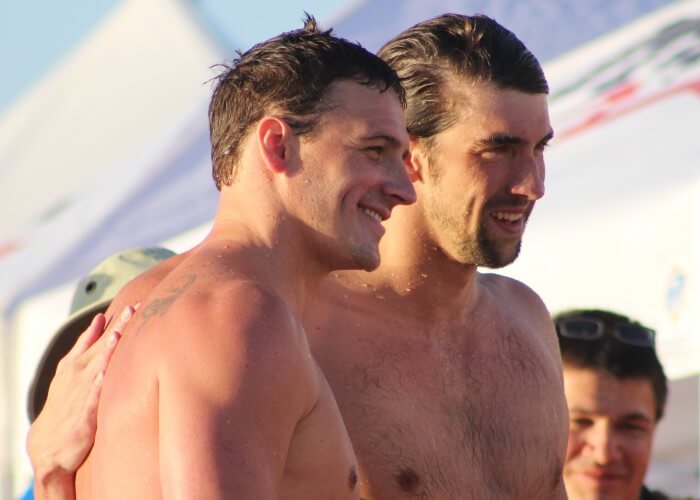
Photo Courtesy: Tori Bursell
More, on the final night of swimming competition at the 2016 Olympic Games, Lochte became embroiled in controversy when he and three United States teammates, all intoxicated, urinated on private property at a Rio de Janeiro gas station and Lochte pulled a sign off a wall. The athletes were then confronted by armed security guards and forced to pay for the damages they caused. A day later, Lochte embellished what took place, claiming one of the guards pressed a gun to his forehead, and the story took off, making headlines around the world. For his actions and exaggeration of the night’s events, Lochte was handed a 10-month suspension by the United States Olympic Committee and USA Swimming.
“You learn from your mistakes,” Lochte said. “Am I going to be perfect? No.”
Phelps hasn’t been perfect either.
For all his achievements and accolades, Phelps stumbled several times during his career. Twice, he was charged with DUI, the second infraction leading to a stint in rehab in which Phelps looked deep with himself and confronted personal demons. Meanwhile, he was also photographed smoking marijuana at a party in 2009. Like Lochte, Phelps served multiple suspensions for his decisions, but acknowledged learning from the mistakes.
Regardless of what transpired away from the pool, Phelps and Lochte will always be remembered for their vast accomplishments on the competitive stage. For Lochte, Phelps served as a motivating figure, a benchmark to chase. For Phelps, Lochte served to remind him that he could not rest on past laurels, and he was not unbeatable.
Overall, Phelps left the rivalry with a 16-4 edge in major competitions.
“Racing against him has been an honor,” Lochte said. “He’s one of the world’s greatest swimmers ever. For me to be a part of that era — to be able to push him, or even to beat him — has been an honor. And it’s been fun. Michael raised the bar and gave me something to chase. I had to get better and up my game to compete with him and that’s what I did.”
It is what rivalries are all about.




I am so thankful that I was alive at this time period to see Michael Phelps career and the friendly rivalry between him and Ryan Lochte as well. We all felt a part of it and so how lucky we were.